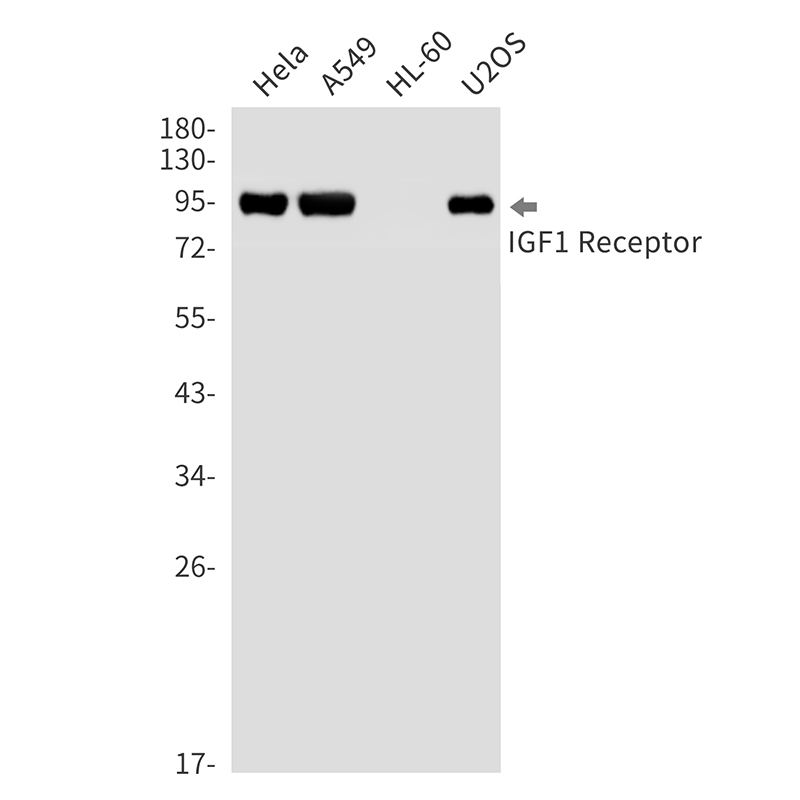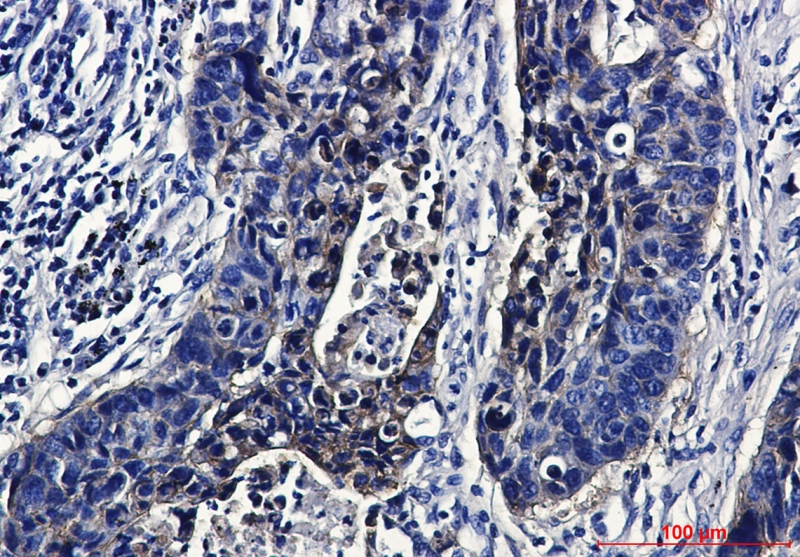

| WB | 1/500-1/1000 | Human,Mouse,Rat |
| IF | 咨询技术 | Human,Mouse,Rat |
| IHC | 1/50-1/100 | Human,Mouse,Rat |
| ICC | 技术咨询 | Human,Mouse,Rat |
| FCM | 咨询技术 | Human,Mouse,Rat |
| Elisa | 咨询技术 | Human,Mouse,Rat |
| Aliases | IGF1R; Insulin-like growth factor 1 receptor; Insulin-like growth factor I receptor; IGF-I receptor; CD antigen CD221 |
| Entrez GeneID | 3480 |
| WB Predicted band size | Calculated MW: 155 kDa; Observed MW: 95 kDa |
| Host/Isotype | Rabbit IgG |
| Antibody Type | Primary antibody |
| Storage | Store at 4°C short term. Aliquot and store at -20°C long term. Avoid freeze/thaw cycles. |
| Species Reactivity | Human |
| Immunogen | Recombinant protein of human IGF1 Receptor |
| Formulation | Purified antibody in TBS with 0.05% sodium azide,0.05%BSA and 50% glycerol. |
+ +
以下是关于IGF1受体抗体的3篇参考文献及其摘要概括:
---
1. **文献名称**:*Targeting the insulin-like growth factor-1 receptor in human cancer*
**作者**:Baserga R, et al.
**摘要**:该综述探讨了IGF1受体在肿瘤生长和转移中的作用,重点讨论了针对IGF1R的单克隆抗体(如figitumumab和cixutumumab)的临床前及早期临床试验结果,提出抑制IGF1R信号通路可抑制肿瘤增殖并增强化疗敏感性。
---
2. **文献名称**:*A phase I study of the anti-IGF1R antibody cixutumumab in combination with temsirolimus in patients with advanced solid tumors*
**作者**:Naing A, et al.
**摘要**:研究报道了IGF1R抗体cixutumumab联合mTOR抑制剂替西罗莫司治疗晚期实体瘤的I期临床试验,结果显示联合疗法安全性可控,并在部分患者中观察到疾病稳定,提示靶向IGF1R与mTOR通路协同抗肿瘤的潜力。
---
3. **文献名称**:*Resistance to type 1 insulin-like growth factor receptor inhibition does not enhance metastasis in a murine model of breast cancer*
**作者**:Ulanet DB, et al.
**摘要**:通过小鼠乳腺癌模型,研究发现尽管IGF1R抗体(如αIR3)治疗可能诱导短期耐药性,但并未促进肿瘤转移,为IGF1R靶向治疗的长期安全性提供了实验依据。
---
(注:以上信息为示例,实际文献需通过PubMed/Google Scholar等平台核对原文。)
The insulin-like growth factor 1 receptor (IGF1R) is a transmembrane tyrosine kinase receptor critical for regulating cell growth, proliferation, differentiation, and survival. Structurally homologous to the insulin receptor, IGF1R consists of two extracellular α-subunits for ligand binding and two β-subunits containing kinase domains. It primarily binds IGF-1 and IGF-2. activating downstream signaling pathways such as PI3K/AKT and RAS/MAPK. Dysregulation of IGF1R is implicated in cancer, diabetes, and aging-related disorders, with overexpression observed in tumors, promoting metastasis and therapy resistance.
IGF1R-targeting antibodies have emerged as therapeutic tools to block ligand-receptor interactions or induce receptor internalization. Examples include cixutumumab and figitumumab, developed to inhibit oncogenic signaling in cancers like breast, lung, and colorectal. While preclinical studies showed promise, clinical trials revealed variable efficacy, attributed to pathway redundancy, compensatory mechanisms, and tumor microenvironment complexity.
Beyond therapy, IGF1R antibodies serve diagnostic roles, aiding biomarker analysis for disease stratification. Challenges remain in minimizing off-target effects (e.g., cross-reactivity with insulin receptors) and optimizing therapeutic strategies through combination therapies or biomarker-guided approaches. Ongoing research focuses on understanding resistance mechanisms and refining antibody specificity to enhance clinical outcomes.
×